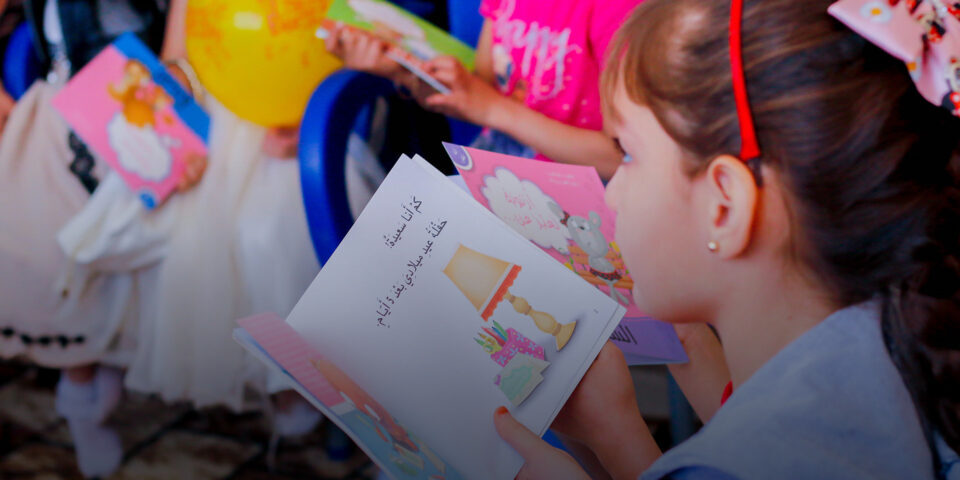Half a year since the formation of the Syrian Transitional Government, the country’s education landscape remains fragmented and challenging. A significant proportion of the Syrian population still requires humanitarian support, and enormous difficulties remain in terms of access to and the quality of education, particularly for children in refugee camps. Despite significant work already underway to get children back to school and to catch up on lost learning, the road back to a safe, inclusive, quality education system is a long one.
Whilst much remains to be done, the fundamental platform for rebuilding the education system must involve safeguarding all children at school so that children are included, feel safe and learning can take place. The right of children to be safe is the prerequisite without which no progress can be made.
At school, Syrian children continue to face many barriers to learning. As well as the psychological effects they have suffered because of shelling, fighting, forced displacement, and losing family members due to the conflict, corporal punishment against children is widespread. Verbal and physical abuses, including beating, are common both in the home and in schools. In fact, corporal punishment is legally permissible in Syria. Despite the UN Convention on the Rights of the Child, there are legal defences for beating children set out in Penal Code (1949) and the Personal Status Act (1953).
Our research into violence in schools, published earlier this year, sought not just to examine perceptions of these acts but to deepen our understanding of why violence against children is either under-reported or unreported and bring greater clarity around safeguarding reporting mechanisms in schools.
The research provided evidence to support our own view, obtained through work in schools over several years, of the impact of violence. Beatings mean children miss school or drop out completely. The psychosocial consequences of violence are characterised in terms of isolation, introversion and withdrawal, and a decline in self-confidence. The research also confirmed what we knew; that violence leads to a deterioration in educational performance. One teacher interviewed for the study said “…the academic impact is obvious, especially for children who are constantly targeted. I’ve seen students whose grades have completely changed after repeated instances of bullying.”
Research findings also demonstrate a consensus that children with disabilities are most vulnerable to these consequences, which are more severe. A safeguarding officer, working in Manahel, commented: “Children with disabilities are particularly subject to this, which contributes to feelings of rejection and longer-term psychological consequences in the absence of support.” Furthermore, gender-norm related differences are shown to be apparent through the research seen in increased aggression primarily attributed to boys, and reduced class or school attendance more related to girls.
The research aimed to build on our safeguarding work to date. The Syra Education Programme, known locally as Manahel, is committed to supporting the formal system to safeguard children at school, and had worked closely with the Education Directorates of Idlib and Aleppo to introduce a Safeguarding Policy, and reporting mechanisms, in 2018.
Through the relationships built between our staff and officials in both Education Directorates, the programme had managed not just to introduce a Safeguarding Policy, but to affect the system and processes in a fragile formal education sector. With the policy itself setting out a series of risk levels from a verbal warning through to court action, the programme worked hard to develop the detail of the structures, support and behaviour change needed to support the Safeguarding Policy.
These included working with the Education Directorates to develop a Code of Conduct for all teachers in NW Syria, creating a disciplinary action process, establishing School Protection Committees, raising awareness raising through magazines, booklets, flyers and teacher learning circles, using complaint boxes in schools and delivering specialist training. Manahel-supported schools provide psychosocial support and safeguarding to children in a number of ways, through Special Education Centres, specialist counselling, and the use of Safe Spaces for children at school, all of which are essential in providing support to children. Through the Safeguarding Policy and the mechanisms to support it, these were now part of a more integrated approach to safeguarding and protection.
Comprehensive support to implementation also requires follow up and monitoring to ensure reporting and action against violence is effective. In this case, it meant Safeguarding/Protection Officers at the school level have formal responsibility to assess and support children who may or have been victims of abuse. It also involved establishing Investigation Committees to handle reports and enforce discipline. Once violence has been reported, Safeguarding/Protection Officers and school leaders to continue to monitor the behaviour of the perpetrator to ensure that abusive behaviour is not repeated.
In many respects, the Safeguarding Policy has been an example of system strengthening in action. The results show a drop in violations dropped from 284 in 2019 to 34 in 2022 – an 88% decrease. Northwest Syria has seen improved teacher attitudes towards children and discipline, and system-wide behaviour change towards child protection.
However, the research published this year showed us that more needs to be done to strengthen the school system to address violence against children across the whole of Syria. Whilst Safe Spaces have been introduced in many schools to provide a psychological first aid, some areas of the school building are seen as unsafe, according to the research, including restrooms with more areas of the school deemed unsafe for children with disabilities.
Amongst the lessons from the research is the need to work with the Ministry of Education to institutionalise safeguarding policies and establish Protection Committees in all schools for long-term sustainability. Ensuring safeguarding also means taking account of how and where different children feel safe by upgrading infrastructure in schools, especially restrooms and Safe Spaces and mapping risk factors both within and to and from school.
Our experience of building safeguarding and protection systems through the Syria Education Programme shows us that the factors that hold problems in place are varied and interconnected and involve addressing and reinforcing accountabilities, interactions, and behaviours within the education system.
The Syrian Government faces a huge challenge in rebuilding confidence in a shattered education system devastated by years of conflict and neglect. As the new Syria develops its path to growth and development, safeguarding children in school is a fundamental step on that journey.



